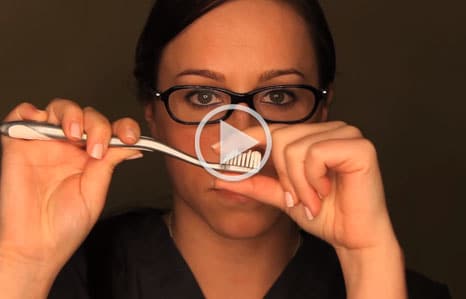Adjusting to Braces
We will strive to make sure orthodontic treatment is as comfortable as possible. We welcome your questions and are here to help you. Together we will work to create a new winning smile!
Our staff members will spend significant time reviewing care for braces, and what to expect after braces are placed.
While Wearing Braces
A patient may experience general soreness. When braces are initially put on, the mouth and teeth may feel tender for up to a week or two. Ibuprofen, acetaminophen, or other over the counter pain medication may be taken to relieve discomfort.
As a patient becomes accustomed to braces and as tooth alignment improves, these symptoms will not be as problematic. However, after each adjustment appointment, a patient may experience some soreness for a short period.
Brushing and Flossing
It’s more important than ever to brush and floss regularly with braces, so the teeth and gums are healthy during orthodontic treatment. Brushing teeth after each meal and before bedtime is recommended to avoid accumulation of plaque and food particles in braces and teeth. Toothbrushes may need to be replaced more often due to wear and tear from braces and appliances. Flossing when wearing braces takes patience and dedication, but it is important to floss teeth every day. The use of a floss threader will aid in performance of this necessary procedure.
The two videos below demonstrate the proper care of teeth and braces during orthodontic treatment.
Eating with Braces
For the first day or so after braces are placed, soft foods are preferable, as the patient will likely feel some soreness. After that, caring for your braces can be achieved by eating (or avoiding) the right foods. Eating certain foods can loosen the brackets or bands, bend or break wires, and could lead to longer treatment time.
Foods to Avoid
The main thing for orthodontic patients to remember is to avoid chewy, crunchy, sticky, and hard foods.
The following is a list of food items you should avoid eating, or eat with caution:
- Chewy foods: bagels, pizza crust, hard rolls, beef jerky
- Crunchy foods: popcorn, ice, hard pretzels, chips, hard taco shells
- Sticky foods: taffy, caramel, licorice, gum (sugar free gum is okay, and may help relieve tooth soreness)
- Hard foods: nuts, candy
- Foods you have to bite into: corn on the cob, ribs or other meat on the bone (cut off before eating), raw fruits and vegetables, such as apples or carrots (cut up into pieces before eating).
Chewing on other hard things (pens, pencils, fingernails) can also damage braces.
Loose Wire or Band
Don’t be alarmed if a wire or band comes loose, as this can happen occasionally. If a wire sticks out and is irritating, wax can be placed on the wire to reduce the annoyance. Call our office for an appointment to check and repair the problem.
Rubber Band Wear
To successfully complete orthodontic treatment, the patient must work together with the orthodontist. The teeth and jaws can only move toward their corrected positions if the patient consistently wears rubber bands or other appliances as indicated.
Regular Dental Check-ups
It is important to maintain regular appointments with your family dentist. We recommend check-ups every six months, or less. Orthodontic treatment does not include checking for cavities, cleaning, professional fluoride treatment, extractions, and other regular dental care. It is especially important that adult patients be checked for periodontal problems, and carefully monitored during the course of orthodontic treatment by their general dentist or periodontist.
Athletics
If a patient plays sports, especially contact sports, it’s important to wear a protective mouthguard. Mouthguards specifically designed for orthodontic patients may be purchased at most sport stores.
